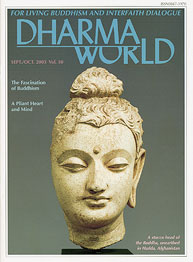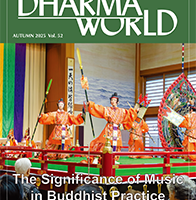September-October 2003, Volume 30(PDF)
Common Truths: Cooperation Among Religions
Reflections
Speaking the Dharma by Nikkyo Niwano
This essay is part of a continuing series of translations from a volume of inspirational writings by the late founder of Rissho Kosei-kai. Dharma World will continue to publish these essays because of their lasting value as guidance for the practice of one’s faith in daily life.
Nikkyo Niwano, the late founder of the Buddhist association Rissho Kosei-kai, was an honorary president of the World Conference on Religion and Peace (WCRP) and was honorary chairman of Shinshuren (Federation of New Religious Organizations of Japan) at the time of his death in October 1999.
A Pliant Heart and Mind by Nichiko Niwano
Patience is a quality that helps us make our way through this world in which we live.
Nichiko Niwano is president of Rissho Kosei-kai and the Niwano Peace Foundation, a president of the World Conference on Religion and Peace (WCRP), and vice-chairman of Shinshuren (Federation of New Religious Organizations of Japan).
Essays
The Fascination of Buddhism by Raimundo Panikkar
The Buddha’s Middle Path is neither mundane nor religious, as “religion” was understood in his time. It is the path of balance, of harmony, of impartiality, of serenity.
Raimundo Panikkar is professor emeritus of religious studies at the University of California, Santa Barbara. Born in Spain to Catholic and Hindu parents, he is an authority on the dialogue between Christianity and Asian religions. Dr. Panikkar’s books include The Cosmotheandric Experience (Orbis, 1993) and The Intrareligious Dialogue (Paulist, 1978). He is also a consultant to UNESCO on interreligious dialogue. He has won Spain’s Premio Espiritualidad, as well as Italy’s prestigious Nonino Prize, which recognized his lifelong “academic and spiritual contributions.”
In Search of Our Common Truth by Jehangir Sarosh
The author describes his passionate belief that it is the major responsibility of religions to be the means of bringing forth peace, reconciliation, and harmony.
Jehangir Sarosh is moderator of the World Conference on Religion and Peace–Europe (WCRP/Europe) and a member of the Executive Committee of the World Congress of Faiths (WCF). He also serves as vice chair of the Week of Prayer for World Peace and is an Executive Committee member of the Interfaith Network of Great Britain. He has been nominated as interfaith representative of the Zoroastrian Trust Funds of Europe (the principal body of the Zoroastrian community in Europe).
Dialogue and Cooperation among Religions by Gianfranco Rossi
All types of differences among us should be seen as sources of humanity’s wealth. Those who disagree with us are not our enemies–they are actually our co-workers in the search for peace.
Gianfranco Rossi has been an activist for religious freedom since 1954. Since 1981, he has cooperated with the United Nations in Geneva, by intervening in favor of religious freedom at the UN Commission on Human Rights. Dr. Rossi has also discussed problems concerning this fundamental freedom with government representatives in Geneva and in many countries, adding contributions to some important solutions.
Interview
The Power of Prayer Is Greater Than We Can Imagine
An interview with Priscilla Elworthy
In May this year, the 20th Niwano Peace Prize was awarded to Dr. Priscilla Elworthy, founder and director of the Oxford Research Group (ORG). The ORG is a nongovernmental organization in the United Kingdom that studies nuclear issues and is a well-known authority on nuclear disarmament and peace strategies. One of the particular characteristics of the ORG is the adherence of Dr. Elworthy and many of its members to the pacifist beliefs of the Religious Society of Friends. Dharma World interviewed her on May 6, when she visited Japan with her colleague, Rosie Houldsworth, to receive the award.
Symposium Address
What Can People Do to Stop War? by Priscilla Elworthy
This is the text of the keynote address, by the recipient of the 20th Niwano Peace Prize, delivered at the Kyoto Symposium of the Niwano Peace Foundation, held on the theme “Citizens Working for Global Security” on May 10.
The Stories of the Lotus Sutra
A Fantastic Castle by Gene Reeves
The goal of the Buddha Dharma is not a static achievement, a place where one can rest permanently. It is a way of life and a never-ending challenge.
Gene Reeves is currently studying, teaching, and writing on Buddhism in Tokyo. A consultant and teacher at Rissho Kosei-kai, he was recently a research fellow at Rikkyo University and prior to that retired from the University of Tsukuba. Before coming to Japan in 1989, Dr. Reeves was the head of Meadville/Lombard Theological School and professorial lecturer in the Divinity School of the University of Chicago.
Buddhist Living
Meeting Adversity with a Calm Heart by Kim Tae Hee
On May 26, 2002, a Rissho Kosei-kai member in South Korea spoke to the organization’s Busan chapter about the personal difficulties that at last led her to gratefully accept the Buddha’s teachings.
Kim Tae Hee is a member of the Busan chapter of Rissho Kosei-kai of Korea.
Buddhist Sculpture
Shakyamuni Holding a Lotus Flower by Takeshi Kuno
At a small temple in southwestern Tokyo are found exquisite statues of Shakyamuni, Maha-Kashyapa, and Ananda carved by the sculptor Genkei, together with statues of over five hundred arhats.
Takeshi Kuno, formerly a director of the Tokyo National Research Institute for Cultural Properties, is now director-general of the Institute of Buddhist Art Research in Tokyo.
Gotama Buddha (62)
The Buddha Suffers from Food Poisoning by Hajime Nakamura
The blacksmith Cunda served Sakyamuni a dish that made him extremely ill and eventually would lead to his death. But whether the sukara-maddava he ate was “tender pork” or “poisonous mushrooms” remains unclear.
The late Dr. Hajime Nakamura, an authority on Indian philosophy, was president of the Eastern Institute in Tokyo and a professor emeritus of the University of Tokyo at the time of his death in October 1999. This ongoing series is a translation of Gotama Buddha, vol. 2 (Tokyo: Shunjusha, 1992).
The Threefold Lotus Sutra: A Modern Commentary (72)
The Sutra of the Lotus Flower of the Wonderful Law
Chapter 7: The Parable of the Magic City (3) by Nikkyo Niwano
This is the seventy-second installment of a detailed commentary on the Threefold Lotus Sutra by the late founder of Rissho Kosei-kai, Rev. Nikkyo Niwano.























































































